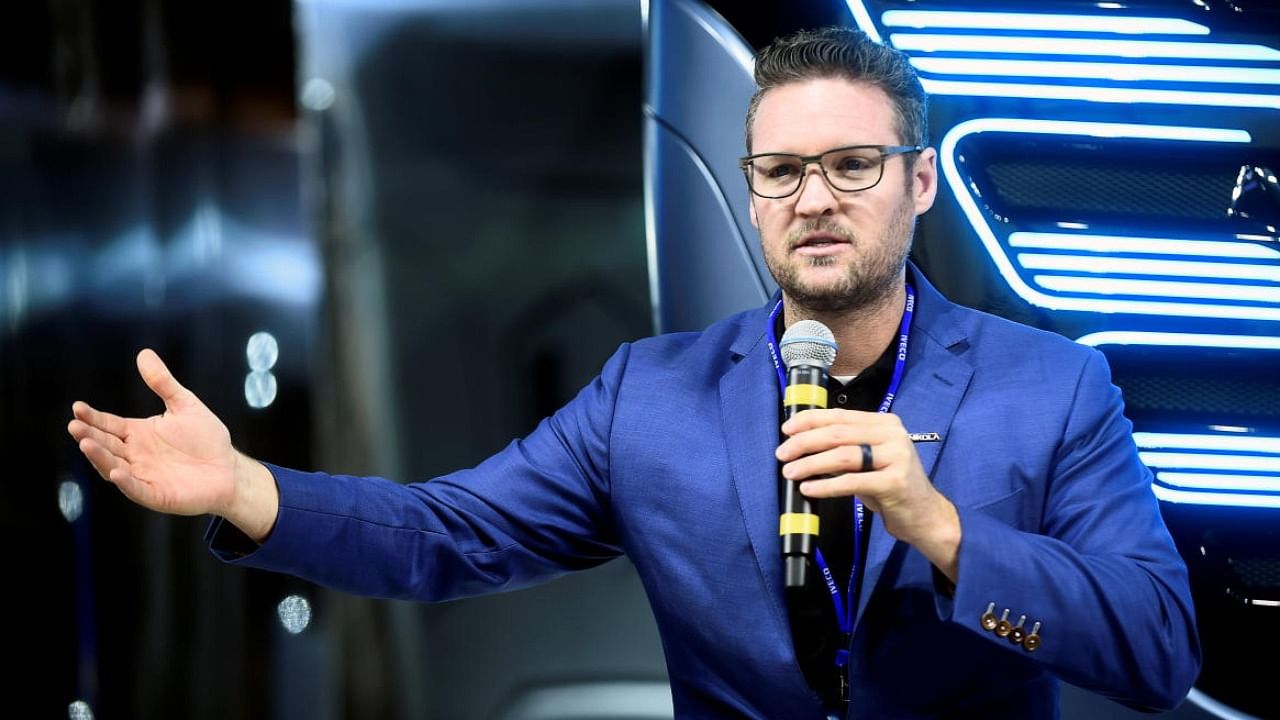
Federal prosecutors Thursday filed securities fraud charges against Trevor Milton, the former CEO of the electric vehicle startup Nikola, the most prominent case against an executive with a business that listed its shares on the stock exchange through a merger.
An indictment by the US attorney’s office in Manhattan charged Milton with misleading investors — in particular retail investors — about the technology for battery and hydrogen-powered vehicles it had hoped to manufacture. In a separate civil case filed Thursday, the Securities and Exchange Commission also accused Milton of securities fraud.
Prosecutors and the SEC said that for nearly a year, Milton used social media, television and podcasts to spread “false and misleading statements regarding Nikola’s product and technology.”
One such misleading statement, the charging document filed by prosecutors said, concerned the company’s Nikola One long-distance truck prototype. The prototype did not work, contrary to the glowing statements that Milton made about it.
Federal prosecutors and securities regulators started investigating Nikola last fall around the time an investment firm published a report questioning its products and some of Milton’s claims. That firm, Hindenburg Research, said the company had put out a promotional video to suggest it had a working prototype — but never disclosed the truck was moving forward only because it was rolling down a hill in neutral gear. Milton resigned a few weeks later.
The SEC also noted in its complaint that a Bloomberg News article, published in June 2020, said Milton had “exaggerated” the capabilities of its truck.
Yet, Nikola went public in June 2020 in a $700 million merger with a special purpose acquisition company, or SPAC, called VectorIQ. SPACs raise money from investors in the hopes of finding a company with an existing business to buy. Deals with such companies have become popular with young, untested businesses, especially those aiming to sell electric vehicles, because merging with them is usually faster, requires fewer disclosures and attracts less scrutiny from investors and regulators than a conventional initial public offering.
Federal prosecutors contend that retail investors were hurt by the stock’s sharp drop, which started last summer, but early investors in the company, including Milton, were not. Nikola’s shares were trading at about $13 Thursday morning, after falling from more than $65 in the middle of last year, a point at which the company had a valuation in excess of Ford Motor Co.’s.
The SEC’s complaint said Milton held approximately 25% of Nikola’s stock after the SPAC deal and “ultimately reaped tens of millions of dollars in personal benefits as a result of his misconduct.”
A lawyer for Milton could not immediately be reached for comment.
Nikola said in a statement that Milton had not been involved with the company since resigning in September.
“Today’s government actions are against Mr Milton individually, and not against the company," the company said. "Nikola has cooperated with the government throughout the course of its inquiry.”
Milton, who dropped out of high school and college, started Nikola with the aim of becoming the Tesla of trucking. Like CEO Elon Musk of Tesla, Milton cultivated a reputation as a charismatic showman with a grand vision for revolutionizing an industry.
“We’re going to completely control trucking in America,” he told Automotive World last year.
Enticed by the prospects of finding the next Tesla, big and small investors poured money into startups like Nikola in recent years. They came to believe that the world will rapidly switch from fossil fuel cars and trucks to electric and hydrogen vehicles, and that startups, not established automakers like General Motors and Daimler, will lead the way. But unlike Tesla, which has produced and sold hundreds of thousands of electric vehicles over several years, many of the newer entrants have struggled to make even a few thousand.
The criminal and civil charges against Milton are another warning to investors about the red-hot market for SPACs, which have raised nearly $200 billion from investors since the beginning of last year. If SPACs do not find a business to buy within two years, they have to return the cash they raised to investors — a feature of the companies that may encourage them to buy shaky or unproven businesses.
The SEC has been warning investors beginning this year about the dangers of investing in SPACs and the businesses they acquire, specifically that people should not be lulled by overly optimistic claims.
Erik Gordon, a business and law professor at the University of Michigan, said authorities “are sending a message they think SPACs are breeding ground for things more serious than just sloppy disclosure.” He added, “They think it is breeding ground for fraud and misrepresentation.”
Just two weeks ago, the SEC reached a settlement with several parties involved in the planned merger of Momentus, a company that said it had developed a unique propulsion technology, and Stable Road Acquisition, a SPAC. The regulators said investors were misled into believing the propulsion system had been successfully tested in space when it had in fact failed.
Federal prosecutors and securities regulators are also investigating Lordstown Motors, a company that hopes to make electric pickup trucks and merged with a SPAC last year.
Lordstown, based in Ohio, said it had raised much-needed cash this week, but it has yet to begin commercial production. Federal authorities are investigating whether the company and its founder, Steve Burns, who resigned as CEO in June, exaggerated claims about customer interest in its truck, which is meant to be used by businesses like contractors and utilities.
Federal prosecutors are also investigating Lordstown’s merger with DiamondPeak, a SPAC put together by David Hamamoto, a former Goldman Sachs partner and a Wall Street real estate investor.